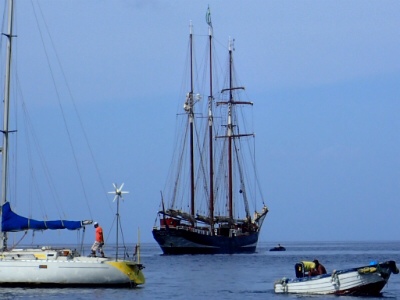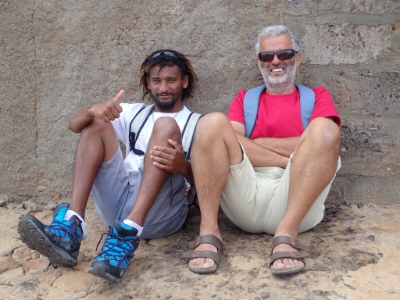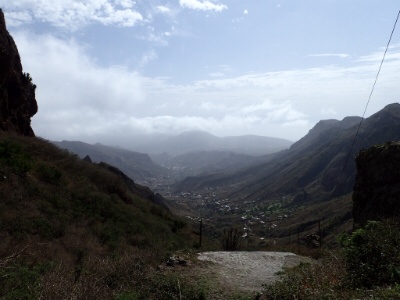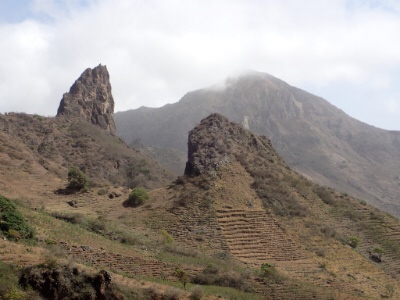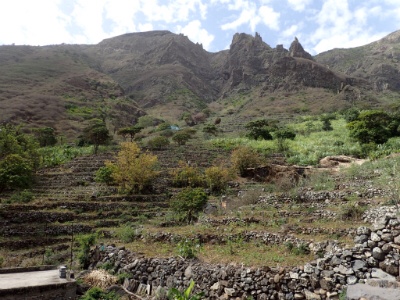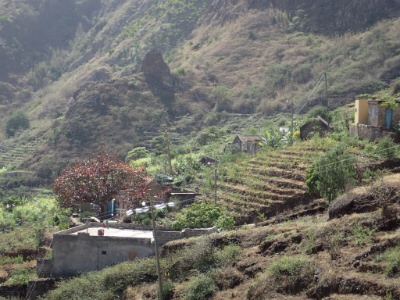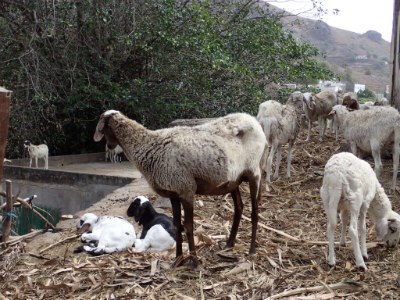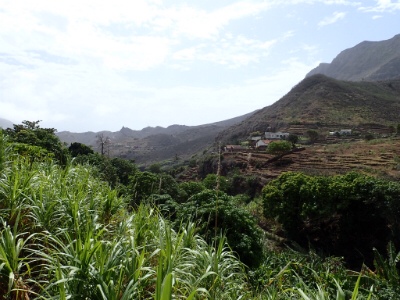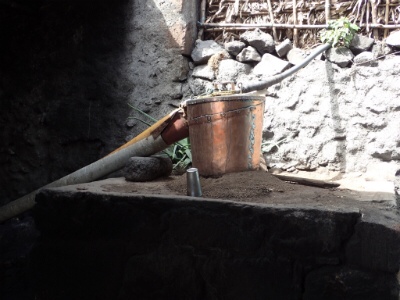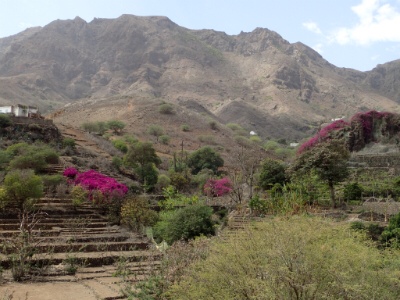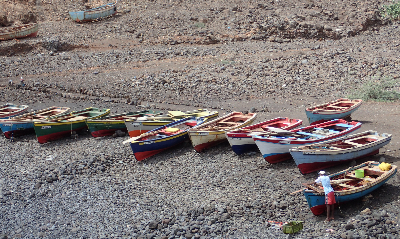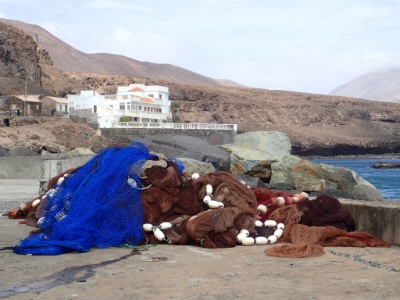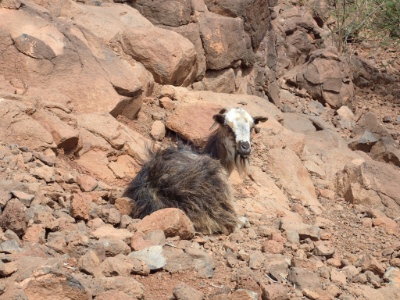Tarrafal, São Nicolau

Caramor - sailing around the world
Franco Ferrero / Kath Mcnulty
Thu 19 Feb 2015 12:53
On Sunday we landed Ding by the fishing boats on the beach and were met by a smiling young man with bijou dreadlocks. He introduced himself as Franci and told us he spoke French and offered a guiding service. He asked if we would hire him for a day to visit inland 'where it is green'. We were impressed by his show of initiative and agreed to be guided on Wednesday.
He also offered to show us round Tarrafal for free (he was clearly bored) but as we were only going to the beach we declined. The beach has potential; fine black sand, warm water, palm tree-lined quiet roadside and a beach café (closed) where I could imagine myself sipping mojito cocktails. Unfortunately broken glass litters the sand, the water is strewn with plastic bags and the current sweeps the village sewage out of the harbour straight onto the beach, local men piss anywhere, replaced at night by local dogs who piss everywhere. Add to that a tingle of jellyfish sting and it is time to relocate.
We walked along the waterfront and found a friendly café where a trio of musicians were playing fiddle, guitar and ukulele. The music was great and they appreciated an audience. A short while later a group of Brits / Dutch from the large schooner came in, ordered beer and poked their cameras within inches of the musicians' faces without seeking consent, maybe they would do that at home but it was just so rude.
Cruise schooner at anchor
Back on the street, a large group of half naked Zulu warriors were marching towards us. We poised ... deciding whether to run for our lives. As they approached we recognised local men and boys blacked up with coal to look like demons for carnival, they were dragging farm implements tied to their waists, banging sticks and bounding around, their leader was wearing a crucifix. I wouldn't want to meet that horde on a dark night!
We followed them to the samba band, the dancing ladies in red, the 'trio electrico' - a local pop band on the back of a pick-up truck and an assortment of 'super-heros' from the Marvel comics. Good fun!
Later we showered for five Euros at a B&B run by an Italian man from Florence.
On Monday Franci met us on the beach again. "See you tomorrow then?" we relented and agreed to hire him Tuesday, our tour would include the Ribeira Brava carnival which is reputed the best in the islands.
We signed in with the maritime police. As they keep the ship's papers until departure, we asked which days they would be closed for carnival. "Don't worry, only Tuesday afternoon." "What about Wednesday?" I asked (remembering my sixth of January experience in the Canaries), "no holiday on Wednesday".
That night we watched the carnival from the boat, there was a beautiful float which later was overturned resulting in people being injured.
Tuesday we met Franci at 10am. We caught the bus (private minibuses which usually operate one route though will change if they have enough customers) to Caxaça. The road out of Tarrafal is very steep and relatively new, its construction combined with the extension of the breakwater has turned this small fishing village into an expanding community.
Franci and Franco waiting for the bus
Caxaça is high up in the hills and from here we walked down an old mule track to Ribeira Brava, the capital of the island. Winter is the rainy season and although the slopes here are much greener, they are far from lush. When it rains, people reach for their irrigation hoses rather than their umbrellas.
Looking towards Ribeira Brava from Caxaça
High terraces
A tremendous amount of work went into turning this arid landscape into gardens
Cape Verdeans returning from abroad buy land and build nice houses
We saw sheep, the odd cow and donkey
Sugar cane in the foreground, then mango trees
We stopped off at a rum factory. The owner buys sugar cane from his neighbours, this is crushed to extract the syrup which is then distilled to make grogue.
A rum still
Franci is a fisherman, nearly everyone in Tarrafal makes their living from fishing. The fishing grounds are rich and the catch is mostly sold locally, though lobster is exported. There is no point catching fish that you won't be able to sell and the demand is limited by the small size of the population. The more fish for sale, the lower the price per fish, no incentive to fish harder and not a lot else to do. I asked him about sharks, he said "sharks are no problem as long as you do not think about them" he added "you guys dive and fish for fun, we fish for a living - we have no choice." His father was a fisherman and then in his later years worked at the tuna canning factory in Tarrafal, his mother sells fish inland to the agricultural communities, if they cannot pay, they barter fruit and vegetables for fish.
He speaks good french which he learnt while working for a French trophy fisherman. The channel between São Nicolau and Santa Luzia is famous for record tuna catches.
Guiding opportunities are few and far between, most sailing boats pass through between November and January, many on tight budgets themselves. São Nicolau is safe and the buses easy to use, there is no need for a guide. Occasionally he is offered agricultural work in exchange for food.
He would like more work, or at least more income but there really is very little work available. We asked why he doesn't go to Praia, the capital of Cape Verde on Santiago island. "Too big and too dangerous, lots of gangs". Working abroad appeals but requires money and contacts, he was well aware of the hazards of illegal immigration, "it would be like prison, you can't go anywhere for fear of being caught or denounced and unscrupulous employers exploit you."
He is proud to be from São Nicolau, a safe and friendly community. A police car passed and beeped its horn to get us to move out of the way. Indignant, I asked how the police behave. He praised the local policing, "if you behave, no problem. They only give you a beating if you are bad". He told us he had nearly been mugged in Santa Maria (the tourist resort) on Sal. He was carrying a good quality rucksack and was being closed in on by a gang, luckily he found a policeman and the men were arrested. Franci is very concerned about the crime levels in Praia, the capital of Cape Verde, it is becoming a gangland modelled on some parts of the U.S., he felt the police in Praia were too lax, letting criminals get away without charge. We have been warned by several people we have met that Praia isn't safe at night and not to leave the boat unattended. It is no longer on our itinerary.
In Ribeira Brava he pointed out a friend "he's a policeman but at the moment he is working six months without wages, he seduced a woman who stole his gun while he was sleeping, it is taken very seriously. After the six months he will face trial and could be dismissed".
Although Portuguese is the official language, school is taught through the medium of Creole. We met people who do not speak Portuguese, only Creole. Franco and I use Portuguese to communicate but Franci thought we should learn a few words of Creole.
Bom Dia - Good Day
Obrigado/a - Thank you.
Toode Ret? - How are you?
Toode Ret. - I'm fine.
Dja Cool. - I'm fine, cool and trendy.
Incidentally the local 'cocacola' is called "Kul". Looking and being 'cool' is a big part of life here, for some it is a full time job.
Just before arriving in Ribeira Brava
We lunched at the market in Ribeira Brava where we bumped into Joe, Debora and the Norwegians, also here for the carnival. Having tried to anchor in Preguiça and found it too lumpy they returned to Carriçal where it was still blowing strong.
As it was still early we caught a bus to Preguiça which used to be the main harbour for the island but has now reverted to being a small fishing village. Although the natural harbour is narrow and affected by strong winds and swell, the route inland to Ribeira Brava was good, not too steep and accessible by cart for the transport of goods. Since the improvement of the facilities at Tarrafal, shipping has relocated, leaving Preguiça to become dilapidated.
The Preguiça fishing fleet
Fishing nets (the house in the background was built by a Cape Verdean who made his fortune in Norway)
Darwin commented on the serious impact of deforestation and overgrazing by goats when he visited the Cape Verde islands in 1832
We returned to Ribeira Brava for a fabulous carnival (see previous posting) and caught the last bus home.
Wednesday we checked the forecast, strong winds and 4m swell due in 24 hours' time. We had been hoping to spend a few days anchored off Santa Luzia, an uninhabited island which has fine white sand beaches. We decided to leave immediately, this way we would still be able to spend one night at Santa Luzia. We rowed ashore to collect Caramor's papers from the maritime police ... closed for carnival holiday!
Kath
